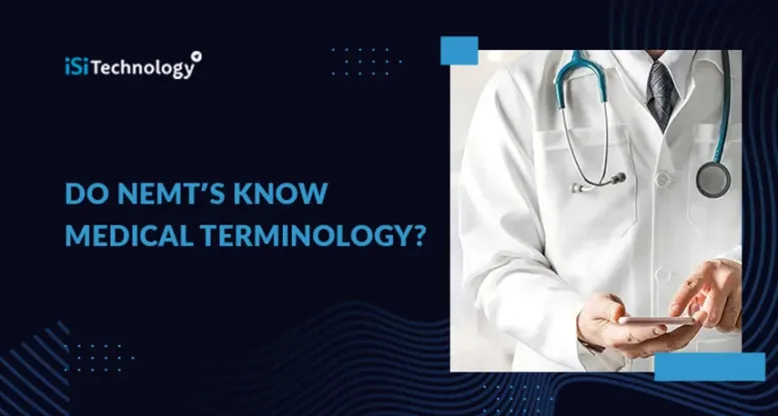Do NEMT’s Know Medical Terminology?

Even though this article is about non-medical transportation services, it is worth saying that primarily this service for patients is handled by the hospitals, care homes, and other healthcare facilities. Whenever the scope or demand for such transportation begins to exceed a facility’s possibilities, they call in for professional assistance from the NEMT companies or simply use a non-emergency medical transportation routing software that “hires” the required vehicle for their needs. And this is where the question is frequently asked: do NEMT’s know medical terminology? Can a healthcare institution request the transport as usual or should it simplify the request and chew over the patient’s requirements in “layman’s terms”?
Legal Requirements for NEMT’s
First and foremost, it is worth mentioning that neither the state law nor the local legislation requires NEMT businesses to give their personnel any official medical training. This means that in theory, a medical institution may face a medically illiterate provider that would need assistance. But this is rather an extremely rare case for the modern NEMT’s.
Today the competition in the NEMT services is so high that business owners do their best to stay ahead of the race. This means that they use the latest NEMT dispatch and billing software, demand official medical training certificates from all their workers: from the managers to the drivers, and are even ready to pay for these activities since it guarantees greater service. This means that all NEMT drivers and controllers do know medical language; the former can easily read and understand the diagnosis in the patient’s profile given in their NEMT dispatch software, or the latter can process the request for a non-medical transport without checking the definition and hence offer the patient the correct vehicle (a van for a stretcher or a wheelchair).
Should you, as a NEMT owner, still be considering the necessity of demanding the knowledge of medical terminology from your employees, here are the top reasons why to do it as soon as possible.
Top Reasons for NEMT’s to Learn Medical Terminology
Terms are used by doctors, nurses, healthcare administrators and agents, insurance companies, care homes and anyone else related to the healthcare industry. Medical terminology is essential to properly define one’s health condition to ensure that an expert reading the medical report can understand the case perfectly.
Even though NEMT is a non-medical transportation business, it is still closely related to medical information. For instance, if a NEMT driver gets a note via the NEMT routing software that says “transport of an AMD patient”, they need to understand that AMD stands for acid maltase deficiency and this means that the patient will be either in a wheelchair or on a stretcher. Without the knowledge of such terminology, a dispatch expert may send a vehicle that is not suitable for such a patient, or a driver may have additional issues with driving such a patient.
Besides cooperation with medical institutions and processing of the incoming transportation requests, medical terminology is also the “official language” of medical papers, such as billing and further paperwork processing. If a NEMT accountant does not understand the term, the wrong taxes and billing may take place, and hence legal issues may arise. Of course, the modern NEMT software for small business helps to minimize human interaction with the bills, yet double-checking is essential for the success of a business.
So the top reasons to make your staff learn medical terminology are:
- To provide proper patient care
- To send the correct type of vehicle
- To ensure the driver understands the patient’s condition
- To simplify communication with the clients (medical institutions and brokers)
- To have healthy and correct paperwork
- To avoid lawsuits due to mishandling of a patient in a particular condition
Note:
While non-emergency medical transportation software can help drivers in understanding the medical terms, there is one more essential piece of knowledge to gain: basic medical training. Yes, non-medical transportation services are not obliged to deliver emergency patients, however some conditions, such as epilepsy, allergies, a wide variety of heart conditions, and even diabetes might unexpectedly lead to a serious worsening of the transported patient’s health; and in such cases, NEMT drivers need to understand how to react.
To give your workers such knowledge, ensure that you organize such trainings or workshops for your employees or clearly state such a demand in your job description.
So, do NEMT’s know medical terminology? And do they need to?
Well, owing to the rapid development of high-tech dispatching software for NEMT businesses, many owners omit the fact of giving their staff medical and first-aid knowledge. However, in reality, brokers and healthcare institutions would rather hire a NEMT company that understands “their language” and can easily flow with the orders coming. So the bottom line is that medical terminology is essential for effective cooperation and easy development of a NEMT business.